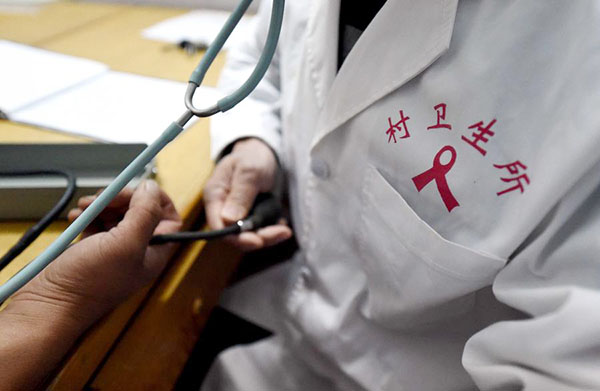 |
|
An HIV positive patient, not pictured, receives a blood pressure test in Weishi county, Central China's Henan province in this Nov 30, 2015 file photo. [Photo/Xinhua] |
BEIJING -- "What are the essential conditions for pregnancy?" "What is safe sex?" "If you or your partner fell pregnant, what would you do?"
In a rural middle school in Yingjiang County, southwest China's Yunnan Province, teacher Nie Yongxian is giving a ninth grade class a sex-ed lesson.
The students are not shy and offered straightforward answers.
This class -- "Youth Love Cabin," is sponsored by the AIDS Prevention Education Project for Chinese Youth (APEPCY), a non-profit organization established by China Charities Aid Foundation for Children and the Chinese Society of Education, to promote sex education in Chinese schools to help prevent HIV/AIDS transmission among the youths.
While the number of people living with HIV/AIDS (PLWHA) on the Chinese mainland continues to rise and there is a trend for younger transmissions, there is still no official sex education in schools to teach students to protect themselves.
Established in 2006, APEPCY has sponsored 681 AIDS prevention cabins or "Youth Love Cabin" nationwide, exploring a new way to teach AIDS prevention and sex education.
Yingjiang experience
In Yingjiang, the China-Myanmar border which is close to the opium-producing "Golden Triangle," the local government has collaborated with APEPCY as the region has a severe drug and HIV/AIDS epidemic.
In 2012, APEPCY piloted six cabins in Yingjiang County, and by October 2014, the project was in nearly all of the county's 200 elementary and middle schools.
"By the end of 2016, we plan to form a full and systematic program, which unites the government and NGO forces," said Zhang Liming, deputy director of the county's education bureau.
Nie Yongxian, a teacher, said she did not know how or what to teach in the beginning.
"For our students, information on HIV/AIDS is what they needed most, " Nie said, "and the dangers of drugs."
Many people in the region are drug users, Nie sai. "Children have seen people taking drugs and may even been tempted themselves -- they do not know whether it's good or bad."
"Therefore, telling them the dangers of drugs is also very important."
For sex education, Nie said she conducted a survey to see what the students wanted to learn, and she answered their questions in class. But later when she underwent training, she learned that sex education should be taught systematically.
"Now, we teach physical hygiene in seventh grade, and expanded to sex education in the eighth grade," Nie said. "I don't think we should teach about pregnancy and contraception any time later."
The third middle school of Yingjiang is the county's biggest rural middle school.
Student Mo Guifang, 15, thinks the Youth Love Cabin is interesting as it taught her about puberty and birth control.
The classes have the support of parents, said principal Li Kaiji.
"As many parents are our students' students," she said, "it meant HIV/AIDS and drug knowledge went beyond the classroom.
Chen Zhongdan, UNAIDS strategic information adviser, supports the APEPCY project.
"We will consider cooperating with APEPCY to introduce the program to the rest of the country, and even the world," he said.
